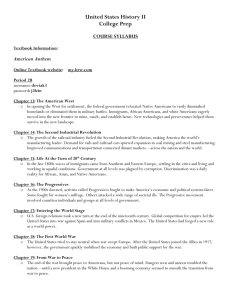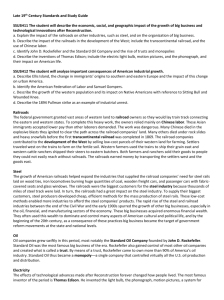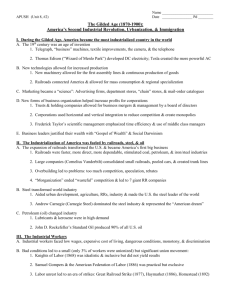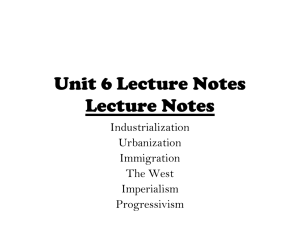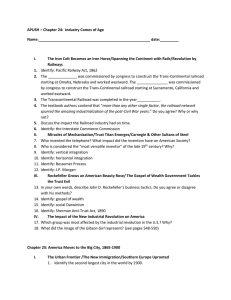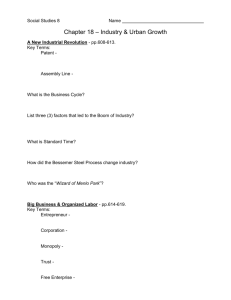Industrial Growth and the Progressive Movement Overview
advertisement
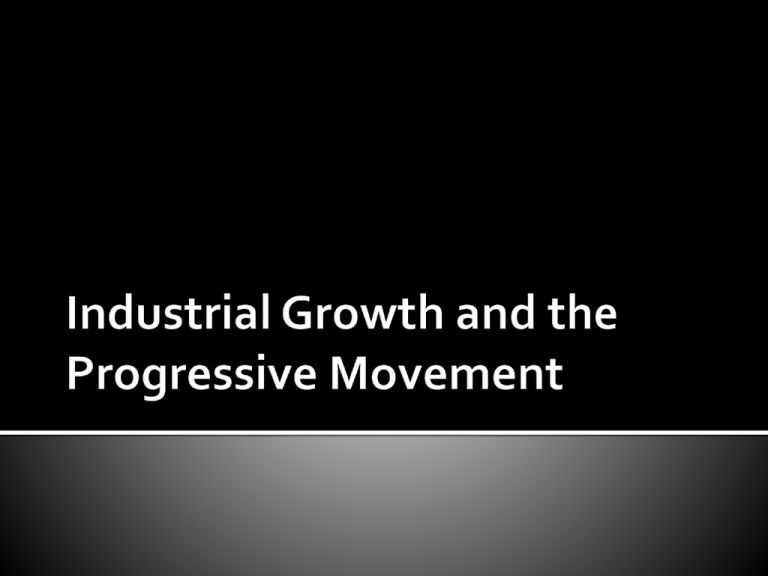
SSUSH11 The student will describe the growth of big business and technological innovations after Reconstruction. a. Explain the impact of the railroads on other industries, such as steel, and on the organization of big business. b. Describe the impact of the railroads in the development of the West; include the transcontinental railroad, and the use of Chinese labor. c. Identify John D. Rockefeller SSUSH12 The student will analyze important consequences of American industrial growth. a. Describe Ellis Island, the change in immigrants‘ origins to southern and eastern Europe and the impact of this change on urban America. b. Identify the American Federation of Labor and Samuel Gompers. c. Describe the growth of the western population and its impact on Native Americans SSUSH13 The student will identify major efforts to reform American society and politics in the Progressive Era. a. Explain Upton Sinclair‘s The Jungle and federal oversight of the meatpacking industry. b. Identify the role of women in reform movements. c. Describe the rise of Jim Crow, Plessy v. Ferguson, and the emergence of the NAACP. d. Explain Ida Tarbell‘s role as a muckraker. The federal government granted vast areas of western land to railroad owners so they would lay train track connecting the eastern and western states. To complete this heavy work, the owners relied mainly on Chinese labor. These Asian immigrants accepted lower pay than other laborers demanded. The work was dangerous. Many Chinese died in the explosive blasts they ignited to clear the path across the railroad companies' land. Many others died under rock slides and heavy snowfalls before the first transcontinental railroad was completed in 1869. The railroad companies contributed to the development of the West by selling low-cost parcels of their western land for farming. Settlers traveled west on the trains to farm on the fertile soil. Western farmers used the trains to ship their grain east and western cattle ranchers shipped their steers to eastern butchers. Both farmers and ranchers sold their goods to people they could not easily reach without railroads. The railroads earned money by transporting the settlers west and the goods east. The growth of American railroads helped expand the industries that supplied the railroad companies' need for steel rails laid on wood ties, iron locomotives burning huge quantities of coal, wooden freight cars, and passenger cars with fabric-covered seats and glass windows. The railroads were the biggest customers for the steel industry because thousands of miles of steel track were laid. In turn, the railroads had a great impact on the steel industry. To supply their biggest customers, steel producers developed cheap, efficient methods for the mass production of steel rails. These low-cost methods enabled more industries to afford the steel companies' products. The rapid rise of the steel and railroad industries between the end of the Civil War and the early 1900s spurred the growth of other big businesses, especially in the oil, financial, and manufacturing sectors of the economy. These big businesses acquired enormous financial wealth. They often used this wealth to dominate and control many aspects of American cultural and political life, and by the beginning of the 20th century, as a consequence of these practices, big business became the target of government reform movements at the state and national levels. Oil companies grew swiftly in this period, most notably the Standard Oil Company founded by John D. Rockefeller. Standard Oil was the most famous big business of the era. Rockefeller also gained control of most other oil companies and created what is called a trust. By means of a trust, Rockefeller came to own more than 90% of America's oil industry. Standard Oil thus became a monopoly––a single company that controlled virtually all the U.S. oil production and distribution. TRUST: type of corporate combination that engaged in monopolies and restraint of trade and that operated freely until the antitrust laws of the late 19th century and early 20th century. MONOPOLY: A situation in which a single firm or individual produces and sells the entire output of some good or service available within a given market. In the decades after the Civil War, more and more Europeans immigrated to America. They differed from earlier immigrant groups who mostly came from northern and western Europe, were typically Protestant, spoke English, and arrived with the government's welcome. In contrast, many of the new immigrants came from eastern and southern Europe, often were Jewish or Catholic, and usually spoke no English. The U.S. government welcomed the wealthy among these new immigrants but forced poorer people to pass health and welfare tests at government reception centers such as the Ellis Island Immigrant Station located in New York Harbor. Whether Asian or European, these new immigrants tended to settle in areas populated by people from the same countries who spoke the same languages and worshipped in the same ways. Because poverty and political instability were common in their home countries, the new immigrants were likely to be poor. They could not afford to buy farmland, so they worked as unskilled laborers and lived mostly in cities. There they created communities to imitate the cultures of their home countries, including foreign-language newspapers, ethnic stores and restaurants, and houses of worship. The new immigrants did not blend into American society the way earlier immigrants had. Unskilled laborers were subject to low wages, long workdays, no vacations, and unsafe workplaces. Because individual workers had little power to change the way an employer ran a business, workers banded together in labor unions to demand better pay and working conditions. Then the labor unions banded together for even more power to change the ways employers ran their businesses. The American Federation of Labor, or AFL, was led by Samuel Gompers. He was president of the AFL from 1886 to 1894 and from 1895 to his death in 1924. His goal was to use strikes (work stoppages) to convince employers to give workers shorter work days, better working conditions, higher wages, and greater control over how they carried out their workplace responsibilities. As eastern regions of the United States became more industrialized after the Civil War, people seeking rural livelihoods moved farther and farther west. In turn, Native Americans had to compete with these newcomers for land. For example, the Sioux signed a treaty with the U.S. government promising ―no white person or persons shall be permitted to settle upon or occupy‖ Sioux territory in the Dakotas but, when gold was discovered there, the government tried to buy the land from the Sioux, who refused to sell it. The Sioux leader, Sitting Bull, then fought U.S. Army troops, led his people to a brief exile in Canada, and finally agreed to settle on a reservation. Similar conflicts played out throughout the West, and many Native American nations received only token reservation lands. Eventually, the Bureau of Indian Affairs would grant nation status to some groups, allowing them self-governance and recognition at the federal level. I wish it to be remembered that I was the last man of my tribe to surrender my rifle. - Sitting Bull In his novel The Jungle, Sinclair told the story of European immigrants working in Chicago's meatpacking industry. The book exposed the poor labor practices and unsanitary conditions that produced contaminated food. Congress was pressured to pass laws to regulate the meatpacking industry and to require meat packers to produce food that was safe to consume. "The Jungle" was the story of Jurgis Rudkus, a Lithuanian immigrant working in Packingtown. Jurgis sees his American dream of a decent life dissolve into nightmare as his job hauling steer carcasses in the stockyards leaves him boneweary and unable to support his family. He loses his his job when he beats up his boss, furious at discovering the cad seduced his wife; then he loses the wife to disease and his son to drowning. But Jurgis finds rebirth upon joining the socialist movement, and the book closes with a socialist orator shouting: "Organize! Organize! Organize! ... CHICAGO WILL BE OURS!" Mostly, the politicians ignored the anti-capitalist plot of the book and focused on eight pages describing the sickening standards of meat packing. Roosevelt sent his own agents to Chicago to investigate whether meat packing was as bad as Sinclair described. The conditions were actually a hundred times worse, the agents reported back. By June 30, Congress had passed the Pure Food and Drug Act, cracking down on unsafe food and patent medicines, and the Meat Inspection Act. To this day, our hamburgers, chicken patties and other meats are safeguarded by the same law. Yet Sinclair considered his triumph empty. "I aimed at the public's heart, and by accident I hit it in the stomach," he said. Women Progressives, in particular, sponsored laws to end child labor and to require government inspections of workplaces Southern and border states passed segregation laws that required separate public and private facilities for African Americans. These were called Jim Crow laws (after a character in an old minstrel song) and resulted in inferior education, health care, and transportation systems for African Americans. In 1896, the U.S. Supreme Court upheld the constitutionality of Jim Crow laws in Plessy v. Ferguson. Under the ―separate but equal doctrine, the Court ruled racial segregation was legal in public accommodations such as railroad cars. Black Schools White Schools African Americans disagreed about how to best oppose Jim Crow laws. One group, which sought full social and economic equality for African Americans, eventually formed the National Association for the Advancement of Colored People to seek full civil rights for African Americans. Better known today as the NAACP, this group still keeps its original name in honor of the people who founded it to help overturn Plessy v. Ferguson. Many reforms came about after journalists investigated and exposed political corruption, child labor, slum conditions, and other social issues. These journalists were called muckrakers, and famous among them were Upton Sinclair and Ida Tarbell. In a series of magazine articles, Tarbell exposed political corruption in New York, Chicago, and other cities, and criticized Standard Oil Company's unfair business practices. Her findings angered the public and contributed to the government's decision to break up the Standard Oil Trust. The progress of business and industry inspired reformers to make important improvements in America's political and social environment. These reformers were known as Progressives. Progressive reforms strengthened American democracy in ways we carry forward into our own time. The Progressives supported new ideas and policies they believed would improve people's lives. They supported increased government regulation of business and industry, efforts to protect consumers and workers, and policies to conserve natural resources. Their efforts to improve living conditions for the poor in cities led to more and better libraries, schools, hospitals, and parks. Settlement House Movement: � White, uppermiddle class, college-educated women who wanted to make a difference in society created and worked at settlement houses, which were like community centers in inner-city, immigrant neighborhoods.� They wanted to improve the lives of slum-dwellers by providing education and child care, teaching English and other basic skills, helping the immigrants get better jobs and housing, and uplifting them culturally (art & music appreciation.) Part of the mission of the settlement house workers was Americanization of immigrants � to teach the immigrants middle-class values. The most famous settlement house was Hull House in Chicago, led by Jane Addams.� �Anti-Trust Regulation �- Progressives sought more fairness in the capitalist economy and thought that if businesses became too big and powerful (trusts or monopolies), then they could exploit consumers and workers and drive out small businesses. �Progressives believed that the government needed to intervene to regulate the size and power of corporations. Examples of anti-trust laws and government agencies to regulate �trusts� are the Interstate Commerce Commission (and the Hepburn Act), the Sherman Anti-Trust Act, and The Federal Trade Commission. Factory Safety Regulations, Limits on Working Hours (mainly for women), Workers� Compensation for injuries, Restrictions on Women and Child Labor - �Reformers were successful in convincing most states to pass factory inspection laws, workers comp, and minimum age of employment laws.� Some states passed laws limiting the number of hours women (but not men) could work.� These regulations were usually difficult to enforce; many employers found ways to evade them.� The Progressives also opposed political bosses and had scorn for citizens' lack of control over them. Progressive election reforms helped to increase ordinary citizens' direct control of government in these ways. Supporters of any new law may collect voters' signatures on an initiative to force a public vote on the issue. This prevents government officials from ignoring the desires of citizens. When enough citizens support an initiative, the government must present the issue to the public as a referendum on which the public may vote. This also prevents government officials from ignoring the desires of citizens. Citizens may remove public officials from office before their terms expire by organizing a recall election. This allows citizens to control who serves in government. Another Progressive reform was the direct election of senators. Under the U.S. Constitution, each state's legislature elected that state's U.S. senators. The Progressives favored the adoption of an amendment to the Constitution that gave voters the right to elect their U.S. senators. They succeeded in their efforts with the adoption of the Seventeenth Amendment in 1913.
